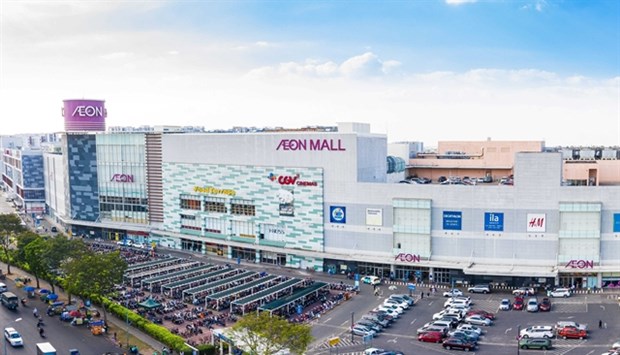Number of profitable Japanese firms operating in Vietnam rises
The proportion of Japanese enterprises operating in Vietnam forecast to be profitable in business activities last year is 54.3 percent, up 4.7 points compared to 2020.
 A view of AEON - Tan Phu Celadon shopping mall in HCM City. (Photo: AEON Vietnam)
A view of AEON - Tan Phu Celadon shopping mall in HCM City. (Photo: AEON Vietnam)This figure is part of a survey on Japanese investment in Asia and Oceania 2021. Chief Representative of the Japan External Trade Organisation (JETRO) in Hanoi Takeo Nakajima presented the figure on January 19.
In this 35th survey, the programme received responses from 702 Japanese enterprises operating in Vietnam.
Notably, the survey period was from August 25 to September 24 last year, coinciding with the time when Vietnam implemented strict social distance measures due to the COVID-19 pandemic.
Therefore, it affected the response results of enterprises, said Nakajima.
However, the number of Japanese businesses investing and operating in Vietnam saying their profit improved reached 31.4 percent, an increase compared to the last survey in 2020.
On the other hand, due to the impact of the COVID-19 pandemic, the recovery of businesses is slower than in other countries.
In particular, in the South and Central regions, more than 40 percent of businesses answered that their operating profit "declined" due to the decrease in operating rates.
As for the manufacturing industry, the proportion of enterprises reporting a profit is 57.5 percent; while non-manufacturing is 51.5 percent.
Towards the new year, 56.2 percent of surveyed businesses answered "improved" in terms of business profit prospects compared to last year.
The percentage of enterprises that intend to expand their business in Vietnam in the next one to two years is 55.3 percent, up 8.5 points from the previous year, ranking first in ASEAN and fourth in 20 countries in the survey, only behind India, Bangladesh and Pakistan.
The percentage of businesses wanting to expand operations in Vietnam has decreased compared to before the pandemic, said Nakajima. However, this was the general trend in other markets, not only Vietnam, due to the impacts of COVID-19.
Vietnam was also a country where the rate of enterprises expanding production was higher than that of the ASEAN region, he added.
In terms of investment environment advantages, market capabilities, development potential; stable political and social situation; and high-quality staff are the highlights of Vietnam compared to other ASEAN countries.
Although the minimum wage last year did not increase, wages in Japanese businesses grew by an average of 5.4 percent.
JETRO's report also shows that businesses in Vietnam are most interested in "saving energy and saving resources" in the trend of efforts to reduce greenhouse gas emissions.
There are few enterprises co-operating with Vietnamese start-ups (5 percent) and enterprises intending to co-operate (3 percent) but enterprises interested in co-operation is 30 percent, higher than the average of the Asia and Oceania region.
Regarding the prospect of new capital inflows in the new year, Jetro believes that when international routes between the two countries are restored and stabilised, it would create a basis for Japanese enterprises to study Vietnamese business environment and make decisions./.













